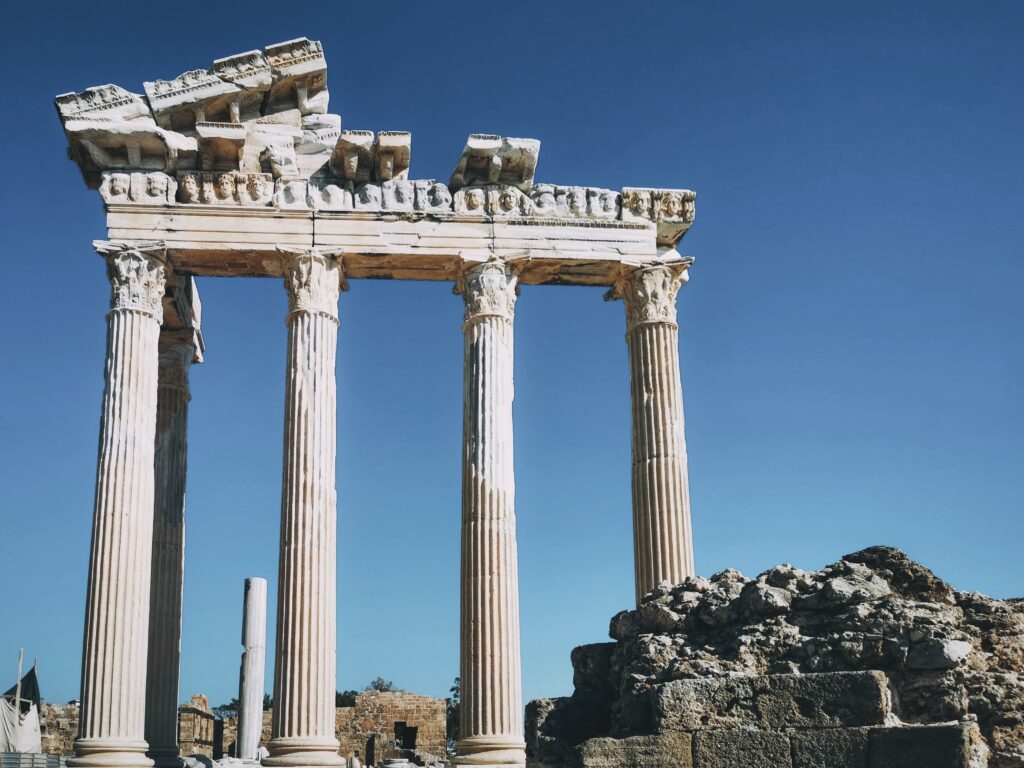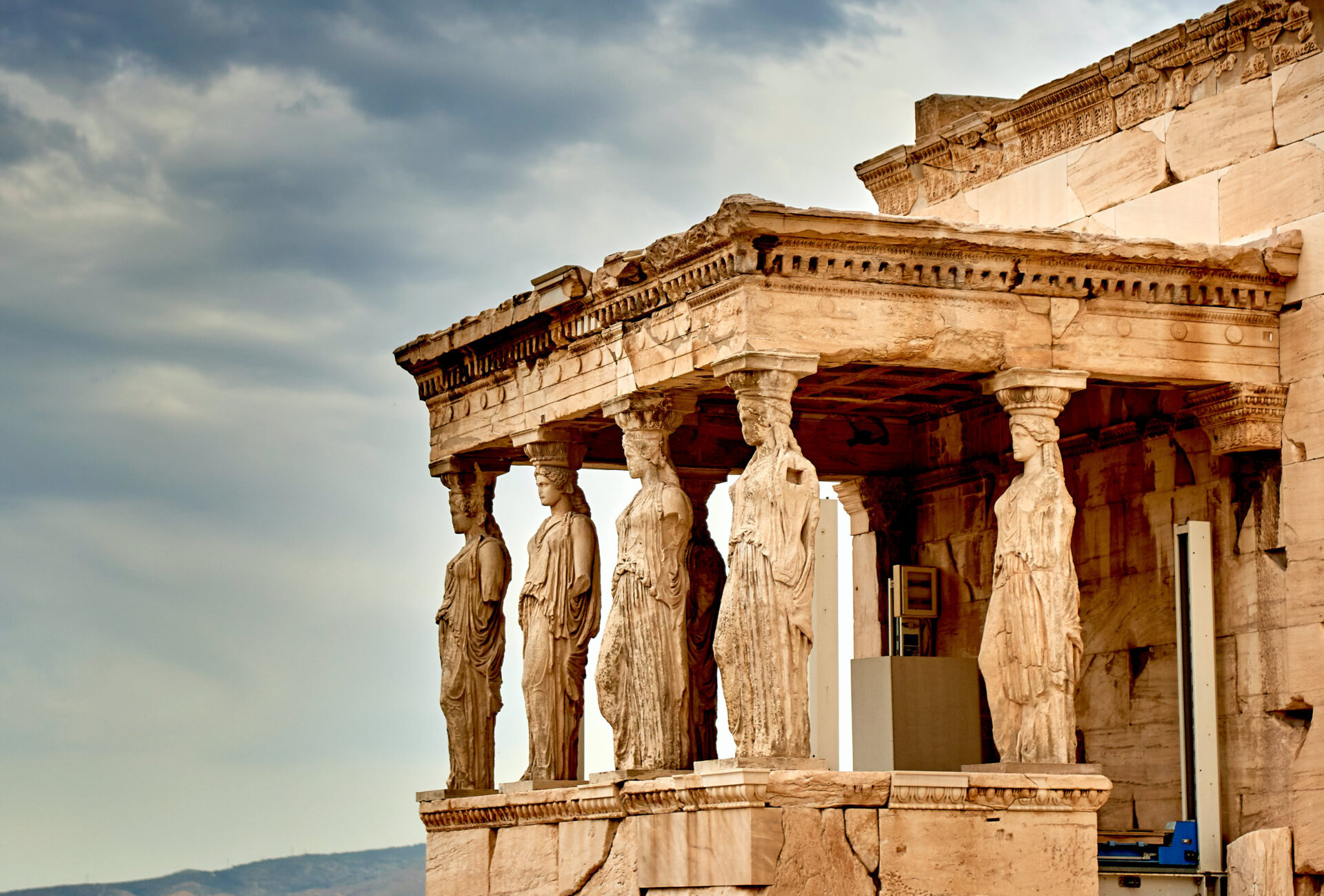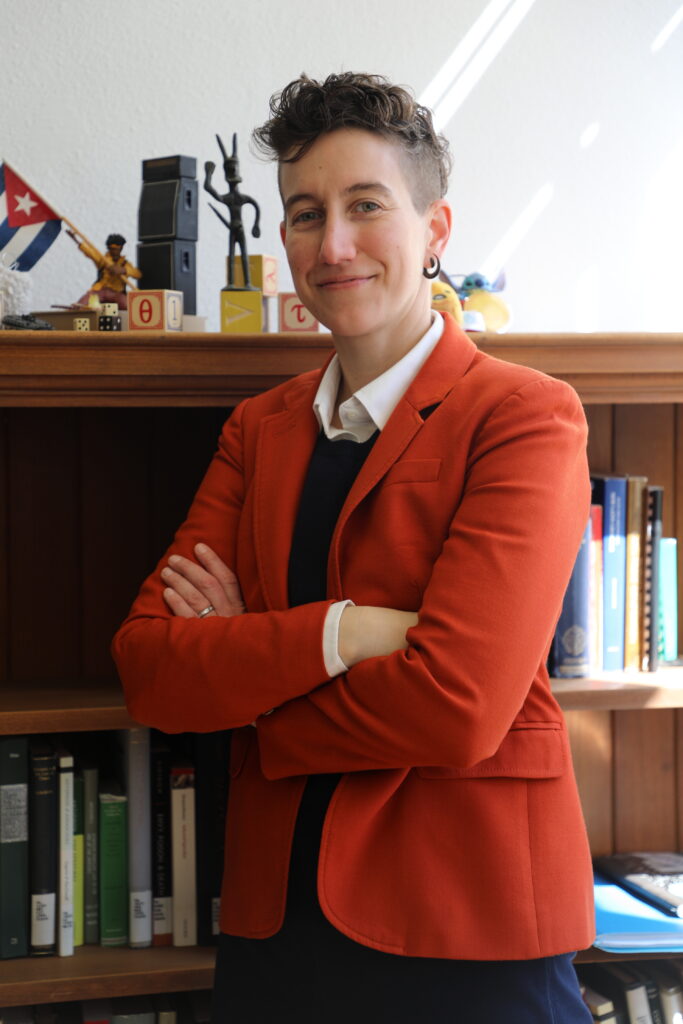Classicist Naomi Campa on How Studying the Past Can Illuminate the Present
It’s election night in the United States and the atmosphere is not particularly tense, probably because there is no actual election underway. Instead, names are chosen by lottery from a pool of a volunteers. Any adult citizen is eligible to enter their name. You’re disappointed that yours was not selected for any official positions, but as a citizen you can still attend meetings of the general assembly and vote directly on high-level decisions. And with one-year term limits placed on most government positions, you can always try again next year. All without buying a single campaign ad.
Such would be the scene if the U.S. was a direct democracy in the mold of ancient Athens rather than a representative one. The word “democracy” itself comes from two ancient Greek words meaning “people” and “power” respectively, but how democracies old and new interpret and implement the idea of people-power varies considerably. Which people? What kind of power? And how does empowering people translate into successfully running a government? These are some of the questions assistant professor of classics Naomi T. Campa attempts to answer. She’s interested not only in how past civilizations thought of concepts like power, freedom, and citizenship, but in how this impacted the lives of regular people.
The Road to the Past
Campa and I meet in my office because hers is currently undergoing mold remediation. I joke that this is very much in keeping with the image many people have of her field. The stereotypical classicist is a stuffy old man surrounded by dusty and/or moldy old books, not a young Miami native who grew up speaking Spanish and earned a bachelor’s degree from the famously progressive New College of Florida. But Campa found her way into classics with no such preconceptions. As an undergraduate she signed up for a course with an interesting title, “Love and Sex in the Ancient World,” and it became her gateway to antiquity.
Reading English translations of the ancient texts on the course syllabus, she noticed something interesting. “I had done the thing you’re not supposed to do, which is buy different editions than what were on the syllabus, and I realized how different some of the translations were and how some of the jokes didn’t track,” she notes. “And that was interesting to me, especially being a bilingual speaker. There’s a lot you can learn through translated works, but if you really want to dig in you have to see how folks are writing about themselves and about the ideas they’re trying to express, and for that you have to get to the original language.”
So, despite having no background in ancient languages, Campa decided to give ancient Greek a shot. Then she added Latin. By the time she started graduate school, she had two years of Latin and three of ancient Greek under her belt. This sounds like a lot but was considered light on languages for classics graduate students, who typically start Latin in high school or earlier. But Campa was sufficiently intrigued with the vast possibilities of antiquity not to be cowed by such expectations.
“Classics is a place where you can do something like a close study of language, but also political theory, drama studies, performance studies, art history, political history, intellectual history, sociology. And all of that is still very much alive,” says Campa. “There are people asking questions in classics like: What did race mean in antiquity? Was race a concept in antiquity? What was the experience of a migrant in antiquity? How do we think about citizenship? How do we think about virtue? It runs the gamut of the types of questions that you might find in other disciplines but centers them on these people that seem so similar to us but are actually very different. And there’s an incredible value in trying to study these deep, pressing questions with a population that is different than ours. It gives us space and literal time away from the questions so that we can engage with them more objectively and deeply.”
The View from the Present
Scholars of antiquity use a variety of tools to construct an accurate picture of the past. Every remnant of classical civilizations, from texts to household objects to organic remains, can add detail to that picture. Campa’s work focuses on intellectual history and ancient Greek political theory, for which she relies primarily on text sources. And as with any other artifacts from the distant past, those sources are often incomplete. She can’t just look up the constitution and legal code of ancient Athens on their government website or peruse the latest Gallup poll to learn about its citizens’ views on immigration.
“We don’t have a piece of paper that Plato wrote,” Campa notes. “We have copies of copies of copies that were made hundreds of years after Plato.”
And the Complete Works of Aristotle that you were assigned in your freshman philosophy survey is misleadingly titled. Aristotle wrote hundreds of texts but only about 30 survived to the present day, and many of these are cobbled together from drafts and lecture notes.
To uncover the meanings of fragmented sources, Campa focuses on the nuances of language, reading texts in their untranslated form and scrutinizing how particular words and phrases are used.

Her forthcoming book, Freedom and Power in Classical Athens, uses this approach to glean how residents of what is widely considered to be the world’s first democracy thought about these crucial yet nebulous ideas and how this translated into day-to-day life for both citizens and non-citizens.
Campa explores how for ancient Athenians, the idea of democratic freedom aligned more closely with a modified version of the philosopher Isaiah Berlin’s concept of “positive freedom” than with our contemporary American notions of freedom. Theirs was a “freedom to” do things, a freedom to actualize one’s will and achieve self-mastery, rather than merely a “freedom from” government restrictions (what Berlin called “negative freedom”).
This was shaped, says Campa, by the fact that Athens was a direct democracy in which most government positions were chosen annually by lot. Citizens of ancient Athens wouldn’t have conceived of their government as an outside entity threatening to curtail their freedom. The citizens were the government. An Athenian citizen was free to do “whatever one wishes” in terms of self-realization, which often meant determining their own future through active participation in government.
“What’s different about the Athenians, as opposed to other Greek citizens at the time, is that they bring that level of participation in the public sphere and being ‘in charge’ to any adult male citizen,” Campa explains. “And that’s really radical at the time.”
In studying the past, Campa also sees an opportunity to reflect on our present-day assumptions. For example, we tend to view democracy as inextricably tied to voting. But ancient Athenians used lotteries instead of elections for all but a small minority of positions because they felt elections limited the kinds of citizens who could occupy public office. To win an election, a person would need to have the time and money to run and also the aristocratic lineage and connections to be well-known to voters. The average citizen wouldn’t have such luxuries and the resulting government would thus represent only the interests of an elite class.
Both ancient Greeks and contemporary Americans are inclined to worry about a government more concerned with helping the wealthy than with serving the people, but our particular definitions of democracy led us to opposite solutions.
“That’s why the Greeks are interesting,” Campa says. “When people think about the history of America or democracy, we inherit this from the Greeks or the Romans, but they are really different people. They’re very weird and they would find us extremely weird. And I think the first step is just acknowledging how odd we would be to each other.”
The second step, according to Campa, is figuring out just what our different assumptions are so that we can understand how we arrived at such different conclusions. Every era has its biases and it can be hard to see them in the moment. Our assumptions don’t feel like assumptions to us. They feel like universal laws. An object at rest stays at rest. Democracy requires voting.
“If we can realize that someone else has a different basis for something that seems so close and familiar to us,” she says. “That can make us reflect on our own beliefs.”
And this is true not just for understanding the people of ancient Athens but also contemporary residents of other countries or even states with different political and social priorities than our own.
Insiders and Outsiders
To conclude Freedom and Power in Classical Athens, Campa does a fascinating case study of a piece of “forensic oratory” — the term for speeches that were presented at trial. The document, titled Against Neaira, provides the text of the prosecution’s oral argument against a woman (Neaira) who was accused of pretending to be an Athenian citizen.
The case against Neaira tells us a few things, in Campa’s analysis. One is that Athenian direct democracy empowers citizens not just by giving them freedoms but by denying those same freedoms to non-citizens. In Neaira’s day, only a fraction of those living in Athens were citizens. Among the non-citizens were foreign residents known as “metics” who could live and work in the city for generations but were prohibited from marrying and having children with citizens and from participating in government. And while female citizens were excluded from Athens’ direct democracy, they did play an important role in religious ceremonies that were considered critical to the running of the state. Violating these restrictions on non-citizens was precisely the crime of which Neaira stood accused: having had children fathered by Athenian citizens, including a daughter who then participated in Athenian religious rites. And because controlling the fates of non-citizens was one of the perks of being a citizen, Neaira’s alleged impersonation was argued to have robbed Athens’ “true” citizens of their freedoms.
Another observation is that anti-immigrant rhetoric is by no means a present-day invention. Because hard evidence for Neaira’s guilt would be difficult to produce in a society without marriage certificates and social security cards, much of the prosecution’s argument takes the form of attacks on the defendant’s character. She is painted as the debased opposite of an idealized Athenian woman, and this is offered as proof of her criminality.
“It’s a really interesting speech and it’s really atypical for what a non-classicist would think the ancient world is like,” says Campa. “If all you know is virtuous white marble statues, there’s a lot of ancient texts that might be surprising and reveal the full spectrum of Greek thought.”
Work like Campa’s is further evidence that classics as a field is pushing boundaries. Not only do scholars tackle topics that resonate with contemporary audiences, but the field itself is becoming increasingly accessible to those from non-traditional backgrounds. Campa herself is involved in two organizations aimed at bringing classics to different populations. She co-chairs the Lambda Classical Caucus, which promotes scholarship on LGBTQ subjects in classics and by LGBTQ-identified scholars, and serves on the steering committee of the Mountaintop Coalition — a networking and support group for scholars of classics from underrepresented ethnic backgrounds. These and other groups work to ensure that classics is an option for anyone with interest, even if they don’t have the resources, connections, and middle school Latin credits.
Campa’s second book will take a closer look at migration in antiquity. She hopes to analyze and compare the different circumstances causing migration both within antiquity and across time. Tracking migration presents its own challenges because it focuses on the people least likely to leave a written record. But that is precisely what makes this subject so intriguing to Campa.
“Thinking about the ideas is really interesting to me. I can just get lost in that,” she says. “But the other piece is how those ideas actually affect how people live.”

